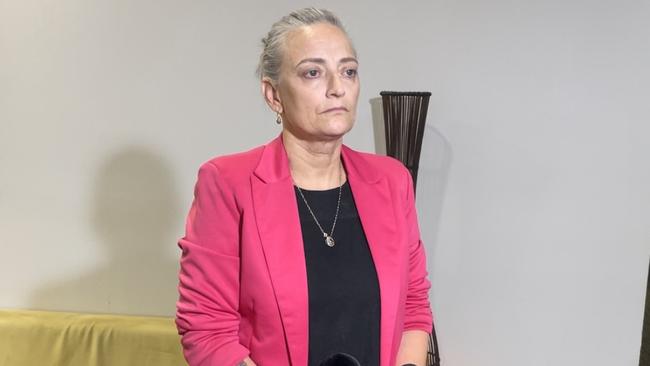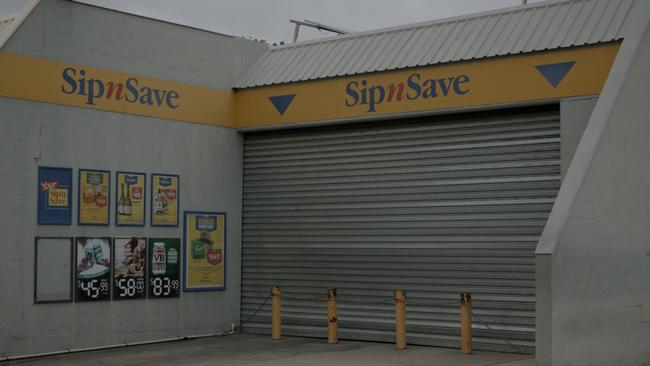Matt Cunningham analysis: Time the government faces facts on alcohol ban impacts
The Police Minister’s denial that lifting alcohol bans had an impact might be the greatest “look-over-here” moment from the government in recent memory, writes Matt Cunningham.
Opinion
Don't miss out on the headlines from Opinion. Followed categories will be added to My News.
The Territory government’s determination to treat its constituents as mugs reached a new high last week.
We’ve become accustomed to our elected representatives telling us the Cavenagh St shade structure is a thriving success.
We were slightly more alarmed when Chief Minister Natasha Fyles repeatedly insisted there had been a bit of “wear and tear” at the Howard Springs quarantine facility, even though we now know there was millions of dollars of criminal damage.
But Police Minister Kate Worden took things to another level when she spoke last week at the Northern Territory Police Association’s annual conference.

NTPA president Nathan Finn had just outlined the association’s concerns about government policies that were increasing the burden on police, specifically the decision last July to lift Intervention-era alcohol bans in Aboriginal town camps.
Responding to Mr Finn, Ms Worden said: “In terms of alcohol in Alice Springs, I will have to disagree, respectfully. We did monitor the situation regularly with police. We were looking at police data throughout Alice Springs to see if there was an upsurge. Around Alice Springs last year we did see 11 remote communities cut off and a whole range of circumstances that were abnormal to any other year.”
I’m not exactly sure which statistics the government was monitoring, but it can’t have been the same data most of us have been looking at.
NT Health data tracks alcohol-related emergency department presentations at Alice Springs hospital on a weekly basis.
It shows that in the three weeks before the bans were lifted these presentations were tracking at slightly below or slightly above the baseline figure (the average number of people presenting for that particular week over an extended period of time).

In the week ending July 22 last year, the same week the bans were lifted, they rose to 32.8 per cent above the baseline figure.
They remained at a highly elevated level until the last week of January this year.
There were only three weeks throughout this period where these presentations fell below the baseline figure.
In some weeks they were more than 38 per cent above average.
To give you an idea in real numbers, that means there were weeks where there were close to 800 alcohol-related emergency department presentations per week at the Alice Springs hospital, or more than 110 per day.
The police data paints a similar picture.
Domestic-violence assaults in Alice Springs spiked by 65 per cent last year and alcohol-related assaults were up 68 per cent, increasing in the second half of the year.
This was confirmed by Police Commissioner Michael Murphy at a press conference on Thursday.
“The data indicates increases in alcohol-related assaults across July to January and we welcomed the interim Alcohol Protected Areas introduction and the liquor restrictions in Alice Springs which are proving well received,” he said.
But just eight minutes later, Ms Worden was back to blaming the weather.
“Last year when the alcohol bans were lifted we kept a very close eye on the statistics and whilst they did rise a little bit straight after the ban (lifted) what we saw was they rose steeply closer to Christmas,” she said.
“We saw extraordinary circumstances last year in Alice Springs which included an unusual weather system come through which cut off 11 communities and we saw a lot of people displaced.”
This might be the greatest “look-over-here” moment since 2010, when the former Labor government tried to tell us elevated e-coli levels at Darwin beaches were due to dirty nappies or bat poo, simultaneously discounting the 1.5 billion litres of raw sewage being pumped into the same body of water each year.
Remarkably, the contamination issues ceased when the infamous “poo-shooter” was closed.
In a similar coincidence, all of the metrics relating to alcohol-related harm in Alice Springs fell significantly at the end of January, when the bans were reinstated.
When we asked the minister’s office to provide the evidence to back up her claims, we were provided with a single line relating to alcohol-related domestic-violence assaults from the second half of last year.
But even these show significantly elevated levels on the previous year, getting far worse from October onward.
For example, in July 2021 there were 61 alcohol-related domestic violence assaults reported to police in Alice Springs.
In July 2022, there were 98, a more than 50 per cent increase.
In August 2021 there were 27.
In the same month a year later – after the bans were lifted – there were 93.
Ms Worden is right that things got significantly worse close to Christmas.
But there is no indication that even then, the government had any intention of doing anything about it.
Despite pleas from police, health professionals, federal politicians Marion Scyrmgour and Jacinta Price and the hospitality industry, it took the Prime Minister to fly into town and demand the NT government reinstate the bans.
And even now, in the face of overwhelming evidence, they still can’t admit they got this one wrong.





